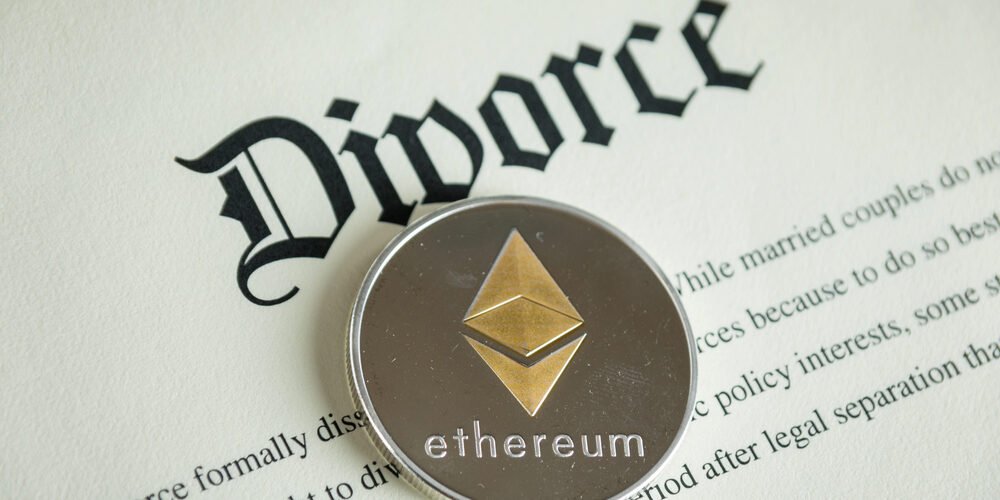Cryptocurrency is everywhere these days. Not only that, but the volatile nature of cryptocurrency, and the rise and fall of different types, can make it a difficult topic to discuss when you are getting divorced. As more couples invest in digital currencies like Bitcoin, Ethereum, and others, the question of how to divide these assets during a divorce has become increasingly relevant. If you are facing a divorce in New Jersey and cryptocurrency is part of your marital assets, it’s important to understand the legal considerations and challenges associated with dividing these digital assets.
Key Takeaways
- Cryptocurrency acquired during the marriage is considered marital property and subject to equitable distribution in New Jersey, while assets acquired before the marriage may be considered separate property.
- The fluctuating value of cryptocurrency can complicate the division process, making it essential to agree on a valuation date or seek help from financial experts for an accurate assessment.
- Locating and tracking cryptocurrency can be difficult, as digital assets can be hidden in private wallets or exchanges. Full financial disclosure is required by New Jersey courts.
- Cryptocurrency can be divided directly between spouses, offset with other assets, or sold and the proceeds divided, depending on the parties’ preferences and circumstances.
Is Cryptocurrency a Marital Asset?
According to the IRS, cryptocurrency is property and is considered as such for federal tax. Cryptocurrency can be classified as either personal property, investment property, or business property, depending on the taxpayer. Now, in Section 2A:34-23.1 of the New Jersey Revised Statues, property is up for equitable distribution. In terms of equitable distribution, that means that a couple’s assets are going to be divided up fairly, not equally. As such, all assets must be disclosed, even cryptocurrency.
In New Jersey, assets acquired during the marriage are considered marital property and subject to equitable distribution. This means that, unless there is a prenuptial or postnuptial agreement stating otherwise, cryptocurrency acquired by either spouse during the marriage may be divided between both parties in a divorce. Even if one spouse purchased the cryptocurrency without the other’s involvement, it could still be considered marital property.
However, if cryptocurrency was acquired before the marriage and kept separate from joint finances, it may be considered separate property and not subject to division. Determining whether cryptocurrency is a marital or separate asset is a critical step in the divorce process.
Valuing Cryptocurrency for Equitable Distribution
Cryptocurrency poses unique challenges when it comes to valuation. Unlike traditional assets like bank accounts or real estate, the value of cryptocurrency can fluctuate dramatically within a short period of time. This volatility can complicate the division of assets, as the value of the cryptocurrency at the time of divorce may be vastly different from its value when initially acquired or even just days later.
To address these challenges, spouses may need to agree on a specific date or period for valuing the cryptocurrency, or they may need to liquidate the asset and divide the proceeds. In some cases, a financial expert or forensic accountant may be necessary to ensure accurate valuation and proper division of the cryptocurrency.
Finding and Tracking Cryptocurrency
Another unique challenge posed by cryptocurrency in divorce proceedings is the ability to locate and track these digital assets. Unlike traditional bank accounts, cryptocurrency can be stored in private digital wallets or traded across various exchanges, making it easier for one spouse to conceal their holdings.
New Jersey courts require full financial disclosure from both parties during a divorce. If you suspect your spouse is hiding cryptocurrency, a forensic accountant experienced in digital assets may be able to help trace the transactions and ensure that all assets are properly disclosed. Courts do not look favorably on any attempts to hide assets, and failure to fully disclose cryptocurrency holdings can result in penalties.
Methods of Dividing Cryptocurrency
Once cryptocurrency is identified, valued, and included as part of the marital estate, there are several ways to divide it between spouses. The method of division will depend on the specific circumstances of the divorce and the preferences of both parties. Here are three common options:
Direct Transfer of Cryptocurrency
One option is for the cryptocurrency to be divided directly between spouses, with each party receiving their proportionate share of the assets. However, this requires both spouses to have digital wallets and some level of comfort with managing cryptocurrency.
Offset with Other Assets
If one spouse prefers to keep the cryptocurrency while the other is less comfortable with digital assets, the cryptocurrency’s value can be offset with other assets, such as real estate or retirement accounts. This allows one spouse to retain the cryptocurrency while the other receives assets of equivalent value.
Liquidation and Division of Proceeds
Another option is to sell the cryptocurrency and divide the proceeds between the spouses. This may be the simplest option if the parties want to avoid the risks associated with cryptocurrency’s volatility.
Contact an NJ Divorce Lawyer Today to Learn More
Dividing cryptocurrency in a divorce can be complex, but with the right legal and financial guidance, it is possible to navigate the process fairly. At Ziegler Law Group, LLC, our experienced family law attorneys are well-versed in handling the division of cryptocurrency and other complex assets during divorce. We can help ensure that your rights are protected and that you receive a fair share of the marital estate, including any cryptocurrency holdings.
If you are going through a divorce involving cryptocurrency or other digital assets, contact us today to schedule a consultation. Call us at 973-533-1100 or fill out our online contact form to learn more about how we can assist you.






